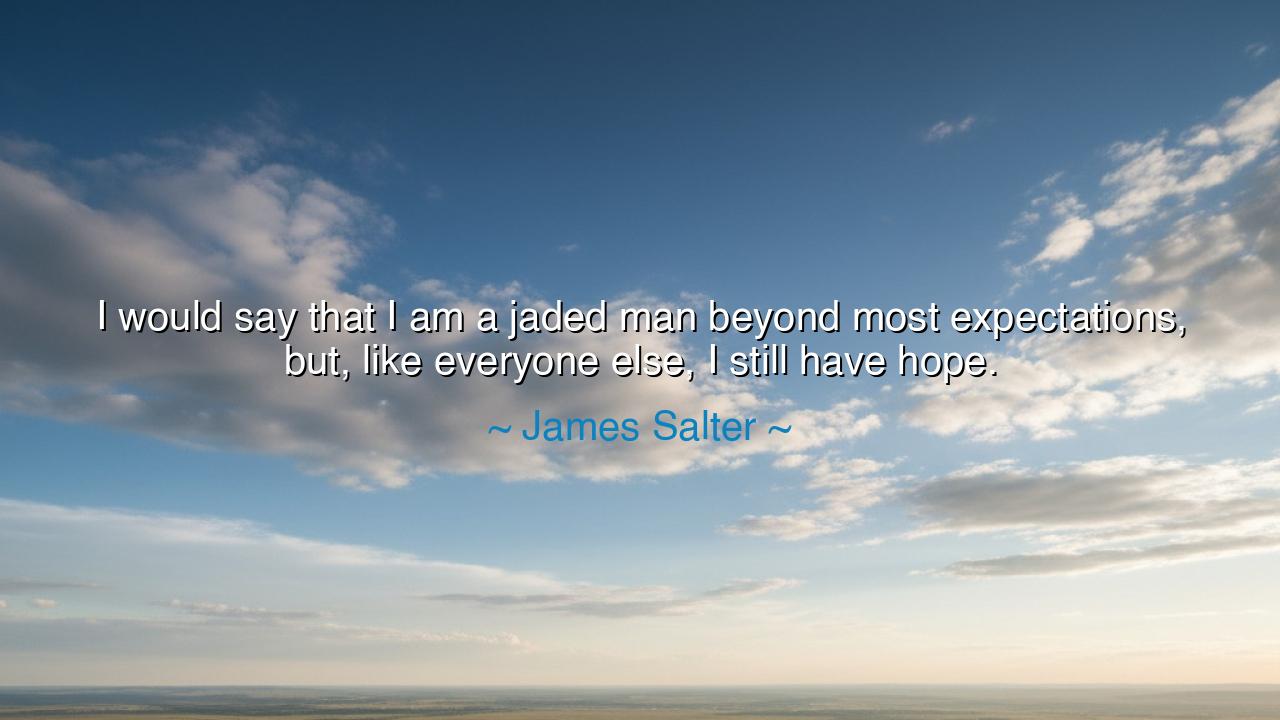
I would say that I am a jaded man beyond most expectations, but
I would say that I am a jaded man beyond most expectations, but, like everyone else, I still have hope.






"I would say that I am a jaded man beyond most expectations, but, like everyone else, I still have hope." Thus spoke James Salter, the quiet craftsman of American letters, whose words flow like a river through the valleys of memory and melancholy. In this confession lies the heart of all who have lived long enough to be disappointed, and yet still find, flickering within themselves, the ember of hope that refuses to die. It is the voice of one who has seen too much of life’s impermanence—its broken promises, its betrayals, its vanishing joys—and yet, against reason, continues to believe in renewal.
Salter’s words speak to the paradox of the human spirit: how one can carry both weariness and wonder in the same breath. To be jaded is to have seen through the illusions of youth—to know that not all love lasts, that success is fleeting, that even beauty fades with time. It is the fatigue of one who has touched glory and found it hollow, who has endured the sharp edges of living and learned that every triumph bears the shadow of loss. Yet, even in that desolation, Salter admits to something greater, something nearly divine: the persistence of hope. Though life may wound and weather the heart, it cannot wholly extinguish the soul’s desire to believe again.
Born from the mid-twentieth century’s tumult of war, art, and disillusionment, James Salter understood the tension between grace and decay better than most. A fighter pilot turned novelist, he had flown through the skies of Korea, seen death blaze across the horizon, and returned to a world that seemed both vibrant and vain. His writing reflects this duality—the tenderness of fleeting moments set against the certainty of their passing. When he calls himself a “jaded man,” it is not with pride, but with resignation, as one who has learned that to live deeply is to lose deeply. Yet, his confession that he “still has hope” is not irony—it is revelation. It is the acknowledgment that even in the ashes of experience, there remains the faint perfume of something eternal: the belief that life, however bruised, still carries meaning.
This dual nature of despair and belief has echoed through the ages. Consider Marcus Aurelius, the philosopher-emperor, who ruled an empire crumbling under its own weight. In his Meditations, he wrote of suffering, decay, and the futility of human ambition, yet he also spoke of duty, virtue, and the beauty of the present moment. Like Salter, he had become disillusioned with the world, yet he did not surrender to despair. His hope was not the naive optimism of youth, but the calm endurance of the wise. He too was jaded—and yet, he still believed in the goodness that flickers within the heart of man.
To live in this tension is to know the true measure of maturity. The jaded man is not a cynic; the cynic mocks life, while the jaded man mourns it. But when such a man still possesses hope, he becomes something more than human—he becomes heroic. Hope, for one who has every reason to doubt, is not weakness but defiance. It is a rebellion against the gravity of despair. The young hope because they do not know better; the old hope because they have learned that without hope, even wisdom withers. To hold hope after disillusionment is to hold light after nightfall—it is the act of a soul refusing extinction.
In truth, this is the eternal rhythm of existence itself. Every dawn is born from the darkness that came before it. Every seed that grows must first split and die. So too in the human heart: our jadedness is the soil in which deeper faith may take root. Only after disappointment can we learn what genuine hope is—not a belief that all will be easy, but a quiet trust that life is still worth living. The ancients called this resilience fortitude, the strength not to escape suffering, but to move through it with dignity and grace. Salter’s words remind us that to live fully is to accept both sorrow and splendor as part of the same vast design.
Therefore, my listener, take this lesson as a torch in your own weary hands: do not fear becoming jaded—fear only losing your hope. The world will bruise you, betray you, humble you. You will see dreams crumble and friendships fade, and you will be tempted to close your heart against wonder. But do not yield. For every disappointment that darkens your path, there remains one light—the stubborn, sacred belief that meaning still exists, that beauty still returns, that love, though wounded, still heals.
And so, as James Salter teaches, even the weary heart must keep a place for hope. To live without illusions but still to believe in tomorrow—that is not folly, but wisdom refined by fire. Be like the oak that stands through storm and season, battered but unbroken, its roots deep in the earth and its crown still reaching for the sun. For though we all become jaded with time, it is hope—fragile, foolish, and divine—that makes us truly human.






AAdministratorAdministrator
Welcome, honored guests. Please leave a comment, we will respond soon